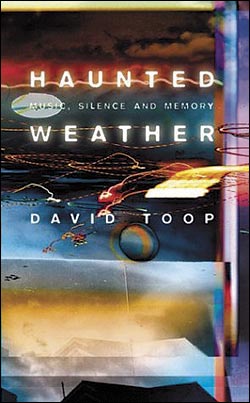GLOBALISM HAS ITS upside. It has nothing to do with NAFTA mandates, bloated profits, or even the good fortune we American trickle-down beneficiaries enjoy by only having to pay $20 for a combination AM/FM/CD player/coffeemaker/alarm clock assembled by a bunch of 12-year-olds in Beijing working 15-hour days for 11 cents an hour. If anything, this quiet dividendthe transnational interpenetration and marriage of musical genreswould probably provide nightmare fodder for the powers that be, assuming they were capable of understanding how potentially subversive it is and will be. Pop music is intrinsically rebel music, after all; as the rebelliously inclined all over the planet come closer and closer to understanding one another’s musical languages, the potential for what William Burroughs and Brion Gysin used to call “disastrous success” increases every bit as rapidly as the availability of Big Macs in Bangkok.
Nobody understands this better than Jace Clayton, aka DJ /rupture. As his two acclaimed mix albums, 2001’s Gold Teeth Thief (Soot/Negrophonic/Violent Turd) and last year’s Minesweeper Suite (Tigerbeat6), demonstrate, Clayton has a genius for spotting affinities in apparently disparate styles ranging from mainstream R&B to Moroccan rai.
“Black music, ancient to the future,” the Art Ensemble of Chicago once described their mission, and that’s what /rupture presents on his decks. He doesn’t just lay it all out side by side like bracelets in a souvenir shop like most DJs (“Jukeboxes,” he calls them dismissively). When Clayton hears twoor threetracks that have something in common, he combines them, same as mash-up bootleggers do. But the rampant jokesterism inherent in mash-ups is the farthest thing from his mind. As Clayton comments via e-mail, “Bootlegs don’t interest me; I’m interested in the big picture, making a broad, complex, textured musical statement. My style of mixing is one way of getting that across. My genre blends and mix style happen out of necessity rather than noveltythe stuff I want to say musically can’t be said any other way.”
Not without an enormous budget, anyway. If turntables charged fares for virtual geographical distance, Clayton would be the brokest man in Barcelona (where the Massachusetts native and ex-Brooklynite currently makes his home). Minesweeper Suite starts sweet as hashish pudding, with the gently rolling triplets and euphonious chants of “Jibal Al Nuba,” by Egyptian internationalist Mahmoud Fadi, rippling abruptly into San Francisco lounge-hopper J-Boogie’s “Gemini Dub,” which then eases into a near-imperceptible fusion of Clayton’s “High Resolution” and “Tectonic,” Heat Sensor’s oft-compiled Afro-Asian/broken-beat/hip-hop masterpiece. That’s a lot of miles for two tracks.
IT’S NOT HARD to see why Clayton puts as much distance between himself and the bootleggers as possible. The payoff with any good mash-upsay, Freelance Hellraiser’s “Smells Like Booty”is in the shock value and subsequent yuks that come from tossing familiar tracks by well-known artists into the same bed. Most of the time, though, the charge that comes from hearing the vocals from Destiny’s Child’s “Bootylicious” and the music from “Smells Like Teen Spirit” together dissipates as quickly as the sort of attraction that leads to one-night stands. Sure, the track is brilliant. But it’d be damn hard to imagine Destiny’s Child and Nirvana working together, even if the latter were still a going concern. That’s because, apart from a few basic rhythmic and tonal considerations, bootlegs rely on difference. Clayton is looking for affinities, and boy oh boy does he find them. Unless you find Foxy Brown intrinsically funny, the duet Clayton fashions between her and ragga rabble-rouser Cutty Ranks, underpinned by Clayton’s own “Rumbo Babylon,” on track three of Minesweeper Suite sounds natural enough to send label execs scrambling to get the three of them into the studio together.
You could argue that Clayton is just giving the ineluctable forces of historyand the marketplacea little kick in the ass. After all, dancehall has already permeated hip-hop and R&B pretty thoroughly. (It’s done a pretty good job on soca and calypso, toomuch to the chagrin of purists.) And, if jungle revivalists had their way, the various breakbeat-based fusions Clayton postulates on Minesweeper would have been standard fare last weekexcept, maybe, for track 19, a breakcore-based blast of Drano for the ears that relies heavily on an untitled track by industrial-strength jazzbos Borbetomagus. Given capital’s propensity for assimilating pretty much anything that emits the faintest whiff of potential moolah, though, even Clayton’s rougher stuff could be the avatar of future radio fodder. But it’s now that interests him. “All the art or culture talk involving ‘future’ involves a fair amount of escapism, which I’m against,” he asserts, “although I do sometimes combine like and unlike to suggest some exciting new sound.”
HE’S NOT AVERSE to using “old” sounds to make new ones, either. On track 21 of Minesweeper Suite, Roberta Flack’s ’70s megahit, “Killing Me Softly,” provides one of the mix’s most dramatic moments, offering a breath of fresh air and a welcome shot of simplicity after all the clatter and clamor that precedes it. Clayton treads dangerously close to accidental comic relief territory, though. Despite the song’s beauty, it’s hard to avoid the fact that Flack wrote it about Don McLean’s “American Pie,” which is funny in and of itselfin a Beavis and Butthead sort of way. Still, the trackand the pair that followdo a marvelous job of illustrating how adept Clayton is at letting a mix breathe, an important thing when you’re combining pre-existing elements to create new onesespecially when you’re giving them a life of their own, as he does.
“Definitely, the great thing about DJing,” Clayton relates, “is that you can have two or three different sounds all happening at the same time but, instead of interference or chaos, you can get a magical new voice that combines all threetheir differences and histories and their similaritieswhile maintaining each participant’s uniqueness.” You can almost hear him pause before finishing, “Might this be a blueprint for human society?”
DJ /rupture plays with Kid606 and Dwayne Sodahberk at Chop Suey, Wed., Aug. 27. $10 adv.








